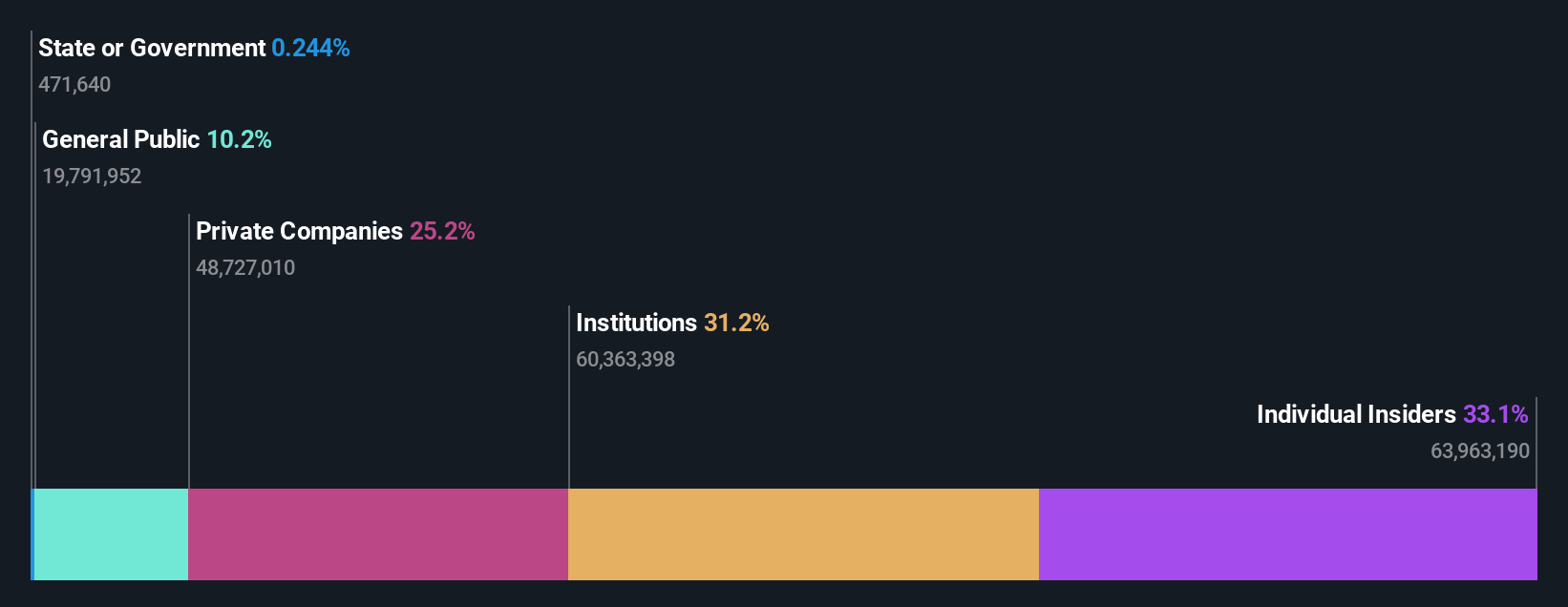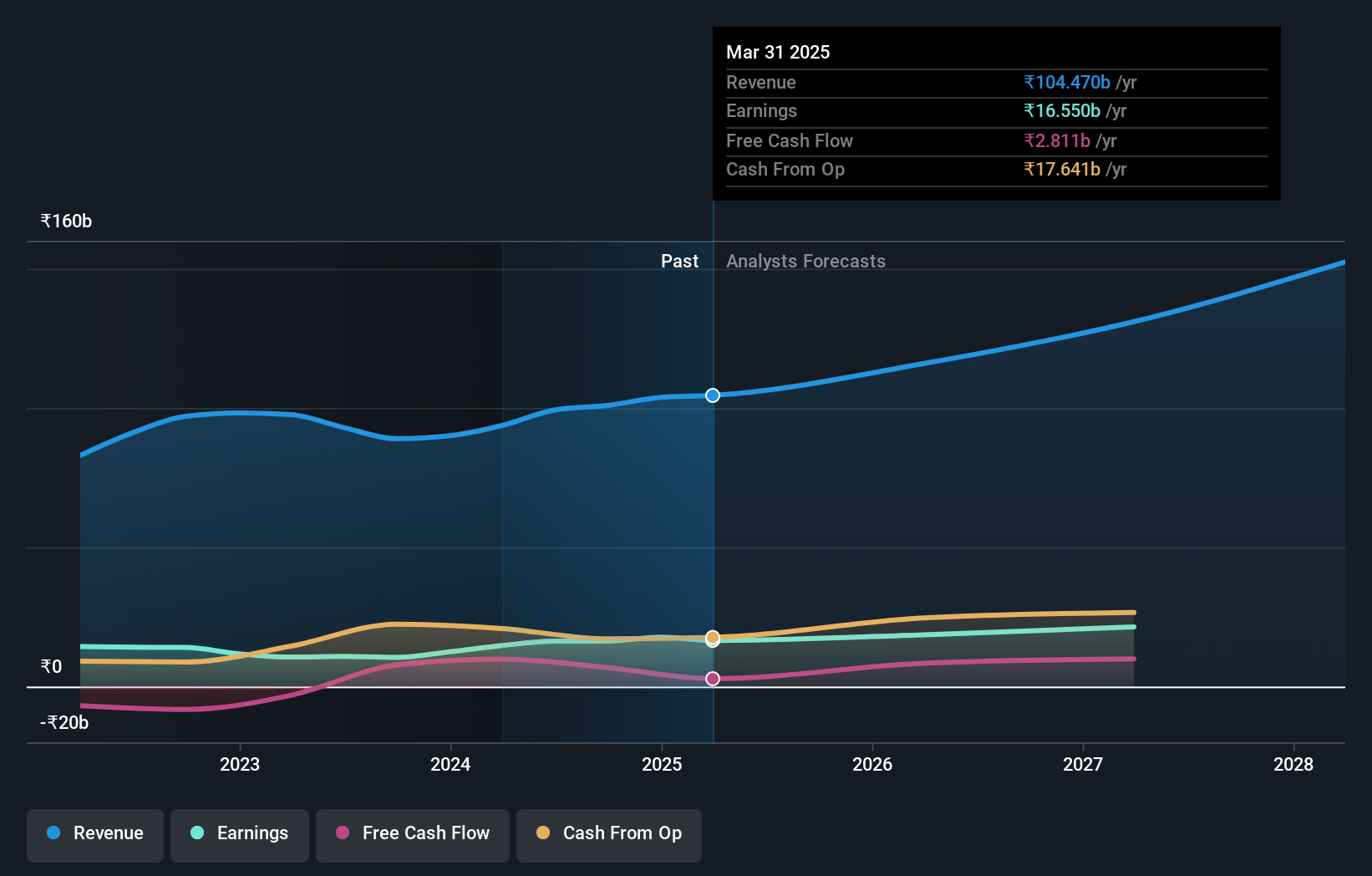- India
- /
- Auto Components
- /
- NSEI:BALKRISIND
With 33% ownership, Balkrishna Industries Limited (NSE:BALKRISIND) insiders have a lot riding on the company's future
Key Insights
- Significant insider control over Balkrishna Industries implies vested interests in company growth
- A total of 2 investors have a majority stake in the company with 53% ownership
- 31% of Balkrishna Industries is held by Institutions
If you want to know who really controls Balkrishna Industries Limited (NSE:BALKRISIND), then you'll have to look at the makeup of its share registry. The group holding the most number of shares in the company, around 33% to be precise, is individual insiders. That is, the group stands to benefit the most if the stock rises (or lose the most if there is a downturn).
So it follows, every decision made by insiders of Balkrishna Industries regarding the company's future would be crucial to them.
In the chart below, we zoom in on the different ownership groups of Balkrishna Industries.
View our latest analysis for Balkrishna Industries

What Does The Institutional Ownership Tell Us About Balkrishna Industries?
Institutions typically measure themselves against a benchmark when reporting to their own investors, so they often become more enthusiastic about a stock once it's included in a major index. We would expect most companies to have some institutions on the register, especially if they are growing.
As you can see, institutional investors have a fair amount of stake in Balkrishna Industries. This implies the analysts working for those institutions have looked at the stock and they like it. But just like anyone else, they could be wrong. It is not uncommon to see a big share price drop if two large institutional investors try to sell out of a stock at the same time. So it is worth checking the past earnings trajectory of Balkrishna Industries, (below). Of course, keep in mind that there are other factors to consider, too.

We note that hedge funds don't have a meaningful investment in Balkrishna Industries. From our data, we infer that the largest shareholder is Rajiv Poddar (who also holds the title of Co-Chief Executive Officer) with 28% of shares outstanding. Its usually considered a good sign when insiders own a significant number of shares in the company, and in this case, we're glad to see a company insider play the role of a key stakeholder. In comparison, the second and third largest shareholders hold about 25% and 5.0% of the stock. Additionally, the company's CEO Arvind Kumar Poddar directly holds 3.9% of the total shares outstanding.
A more detailed study of the shareholder registry showed us that 2 of the top shareholders have a considerable amount of ownership in the company, via their 53% stake.
While studying institutional ownership for a company can add value to your research, it is also a good practice to research analyst recommendations to get a deeper understand of a stock's expected performance. Quite a few analysts cover the stock, so you could look into forecast growth quite easily.
Insider Ownership Of Balkrishna Industries
The definition of company insiders can be subjective and does vary between jurisdictions. Our data reflects individual insiders, capturing board members at the very least. Company management run the business, but the CEO will answer to the board, even if he or she is a member of it.
I generally consider insider ownership to be a good thing. However, on some occasions it makes it more difficult for other shareholders to hold the board accountable for decisions.
Our information suggests that insiders maintain a significant holding in Balkrishna Industries Limited. It is very interesting to see that insiders have a meaningful ₹153b stake in this ₹464b business. It is good to see this level of investment. You can check here to see if those insiders have been buying recently.
General Public Ownership
With a 10% ownership, the general public, mostly comprising of individual investors, have some degree of sway over Balkrishna Industries. This size of ownership, while considerable, may not be enough to change company policy if the decision is not in sync with other large shareholders.
Private Company Ownership
We can see that Private Companies own 25%, of the shares on issue. It might be worth looking deeper into this. If related parties, such as insiders, have an interest in one of these private companies, that should be disclosed in the annual report. Private companies may also have a strategic interest in the company.
Next Steps:
While it is well worth considering the different groups that own a company, there are other factors that are even more important. For instance, we've identified 1 warning sign for Balkrishna Industries that you should be aware of.
But ultimately it is the future, not the past, that will determine how well the owners of this business will do. Therefore we think it advisable to take a look at this free report showing whether analysts are predicting a brighter future.
NB: Figures in this article are calculated using data from the last twelve months, which refer to the 12-month period ending on the last date of the month the financial statement is dated. This may not be consistent with full year annual report figures.
Valuation is complex, but we're here to simplify it.
Discover if Balkrishna Industries might be undervalued or overvalued with our detailed analysis, featuring fair value estimates, potential risks, dividends, insider trades, and its financial condition.
Access Free AnalysisHave feedback on this article? Concerned about the content? Get in touch with us directly. Alternatively, email editorial-team (at) simplywallst.com.
This article by Simply Wall St is general in nature. We provide commentary based on historical data and analyst forecasts only using an unbiased methodology and our articles are not intended to be financial advice. It does not constitute a recommendation to buy or sell any stock, and does not take account of your objectives, or your financial situation. We aim to bring you long-term focused analysis driven by fundamental data. Note that our analysis may not factor in the latest price-sensitive company announcements or qualitative material. Simply Wall St has no position in any stocks mentioned.
About NSEI:BALKRISIND
Balkrishna Industries
Manufactures and sells tires in India, Europe, North America, and internationally.
Excellent balance sheet and fair value.
Similar Companies
Market Insights
Community Narratives



